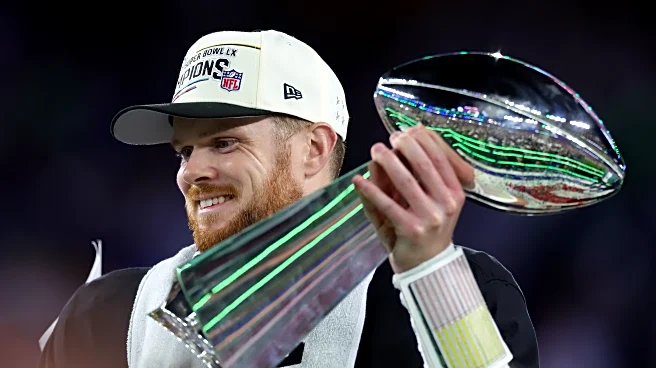What's Happening?
Tennessee has announced a new partnership with Adidas, marking a return to the brand after a previous 20-year collaboration that ended in 2014. The new 10-year contract is described as one of the largest apparel deals in college sports history, valued at over $10 million annually in product and cash. A significant aspect of this deal is its focus on name, image, and likeness (NIL) opportunities for Tennessee athletes. Adidas plans to offer unprecedented NIL opportunities across all 20 sports at the university, aiming to provide athletes with substantial endorsement and commercial deals. This move is part of a broader trend in college sports where apparel companies are increasingly involved in athlete compensation through NIL agreements.
Why It's Important?
The partnership between Tennessee and Adidas highlights the evolving landscape of college sports, where NIL deals are becoming a crucial factor in recruiting and retaining athletes. By offering substantial NIL opportunities, Tennessee aims to enhance its competitive edge in attracting top talent. This development reflects a shift from traditional revenue-sharing models to more direct athlete compensation through third-party endorsements. The deal sets a new standard for NIL investment in collegiate sports, potentially influencing other universities and apparel companies to adopt similar strategies. This could lead to increased financial benefits for athletes and reshape the dynamics of college sports partnerships.
What's Next?
As the partnership begins next July, Adidas is already working to strike individual deals with Tennessee athletes. This approach may serve as a model for other universities and apparel companies, with several power programs like LSU, Penn State, and USC currently negotiating similar contracts. The success of this model could lead to a broader adoption across college sports, with multimedia rights partners and marketing agencies playing a significant role in facilitating athlete compensation. The College Sports Commission's enforcement process will be crucial in determining the legitimacy of these third-party deals, potentially influencing future NIL agreements.
Beyond the Headlines
The shift towards NIL-centric contracts raises questions about the long-term impact on college sports. Ethical considerations regarding athlete compensation and the role of apparel companies in influencing college sports dynamics are emerging. The legal framework governing NIL deals is still evolving, with potential challenges to the standards set by the College Sports Commission. This development could lead to a reevaluation of traditional booster collectives and their role in athlete compensation, as schools seek more sustainable models for supporting their athletes.












